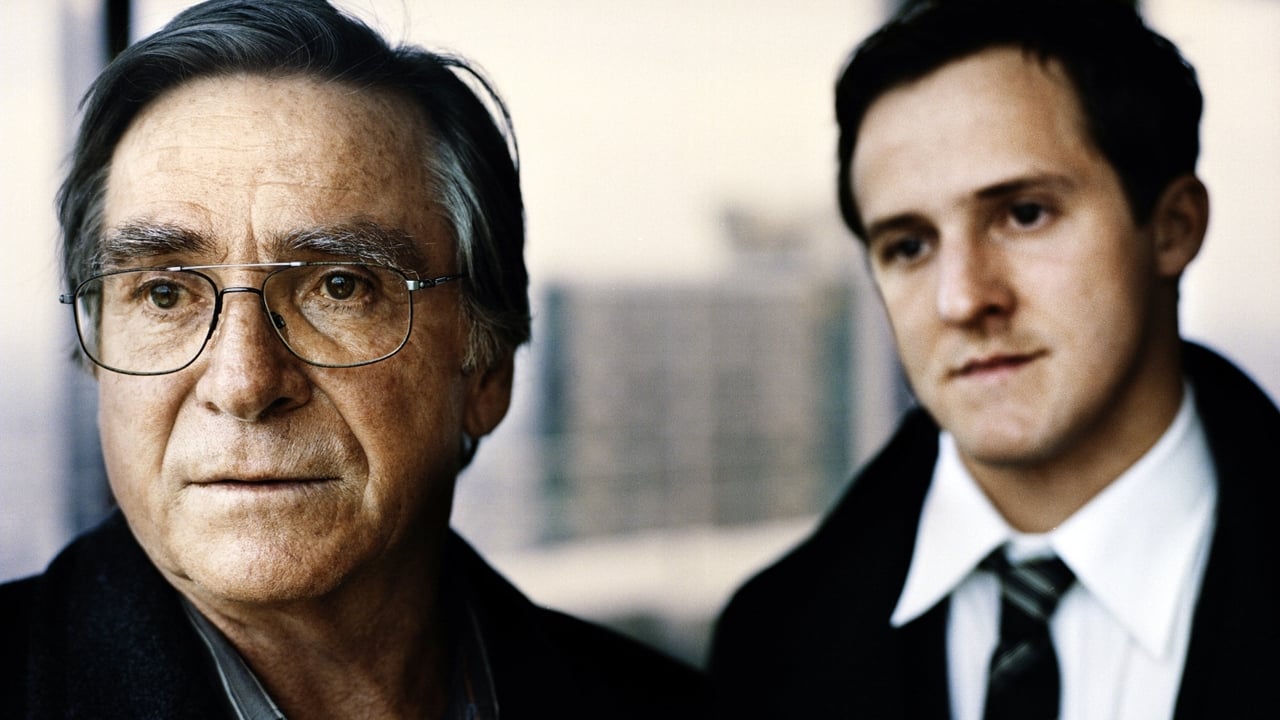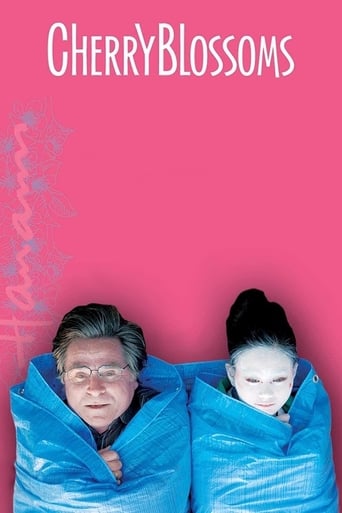

One of my all time favorites.
... View MoreIntense, gripping, stylish and poignant
... View MoreGood start, but then it gets ruined
... View MoreThe movie's neither hopeful in contrived ways, nor hopeless in different contrived ways. Somehow it manages to be wonderful
... View MoreA very sentimental film about eternal love. After the unexpected loss of his wife while on vacations to the Baltic sea, Rudi goes to Japan to escape from his sadness, to his son's house Karl, in Tokyo. Days pass with the memories of his beloved wife Trudi, but also exploring the big city. Lost in the lights of skyscrapers at night, at day staying most of the time in the small apartment, occupied by simple housekeeping, life seems so unbearable for the lost in the bitter shadows of memories husband, until one day at the park with the blossomed cherries, he meets Yu - a young girl playing pantomime. Impressed by her slow and ritual movements, he goes closer to her and they soon become friends. But this was not to last. In a journey to mount Fuji, waiting for the mountain to be revealed to them every morning, when opening the window, days where passing. This reveal was to happen at his last day - to see the mountain with it's snowy pick. He then, moves closer to the lake, where the majestic mountain was reflected and then came to his eyes the image of himself dancing the ritual movements of the Japanese dance (Butoh) with his wife - together and forever. And immediately then, came the moment to die, by the side of the lake. A very touching film of the eternal love, but also a really true study of the contemporary way of living, which can not offer the real essence of life, to human beings. Between loss, sorrow, the lights and furor of a big city, the company of his somehow distant son - absent all day to his work, the salvation of the soul of the unlucky widower, came by the Japanese girl, dancing with the movements of the human body shadows - which means the movements of the inner unsatisfied, waiting for salvation soul. All active elements of the movie especially direction, cinematography, acting photography, music, filming locations, contributed to a very satisfying evolution of the plot above.
... View MoreWhen her husband is diagnosed with a terminal illness, a German woman named Trudi decides it's time the both of them paid a long overdue visit to their adult children - two of whom live in Berlin and one in Japan. The catch is that the husband, Rudi, doesn't even know he's sick and neither do the kids. Thus, Trudi must live with this horrible secret while putting on a brave face for those around her. But then a different, wholly unforeseen tragedy strikes the family and the movie heads off into an entirely new and utterly unanticipated direction from where we thought it was going.A German movie set largely in Japan, "Cherry Blossoms" is a beautiful and heartbreaking film about living for the moment and of not putting off till tomorrow what you can do today. It's also marvelously perceptive about the dynamics of parent/child relationships, especially when, as is true in this case, the parents are viewed by their self-absorbed offspring more as burdens to be endured than blessings to be cherished. The irony is that Rudi and Trudi have more in common with - and indeed are treated better by - many of the strangers and casual acquaintances they come in contact with than they are by their own children.But the movie is also an examination of marriage and of how partners can become so entwined with one another as a couple that they lose their identities as individuals, missing out on the dreams and goals they had for their lives when they were still young and unattached. This is certainly the case for Trudi, who has harbored a lifelong desire to take up Japanese dancing, a desire that Rudi, in his selfish indifference, has pretty much squelched in her for the duration of their marriage. Such a realization of lost opportunities can lead to regrets, recriminations and despair at the end of the road, yet in the case of Rudi and Trudi, one learns that lesson a little too late - and the other just in the nick of time.Elmer Wepper and Hannelore Elsner are magnificent as the aged couple, superbly capturing the deep-seated but often unspoken love that each spouse has for the other. A fine supporting cast, led by Maximilian Bruckner as one of their sons and Aya Irizuki as a young street artist who befriends Rudi in his time of greatest need, adds to the movie's richness. Another crucial element in the emotional force of the movie is the richly elegiac score by Claus Bantzer.The glory of this exquisitely realized and profoundly moving film is its willingness to grapple with some truly major issues - of life and death, of sorrow and loss, of filial and marital relationships - without getting heavy-handed and preachy about it in the process. Every moment in this film feels real and unforced, yet the movie itself has the minutely worked-out grace and precision of Japanese performance art (which we see quite a bit of throughout the course of the film). In fact, near the end, there is a fantasy dance sequence that is, quite frankly, one of the most utterly spellbinding scenes I've come across in ages.Masterfully directed by Doris Dorrie, "Cherry Blossoms" is a lyrical and unforgettable work that takes its place among the truly outstanding films of recent times.
... View MoreI think it was for me a sublime movie experience. I tells about many things: lack of communication between generations, the passing of life and the necessity to cherish it while it lasts, the cultural differences and similarities between Germany and Japan. It also describes how we often do not know well even those closest to us. In the beginning the old couple seems so boring, one-sided and uninvolving, boy does it change as the film unravels. The film is very well written, directed and acted. Also one of the best, wholest descriptions of the current life in Japan I ever saw on celluloide. I loved the character of the young girl in Japan, her wonderful, delicate dignity in the face of the horrors of her lonely life. The man entered her life by coincidence and changed it for the better, maybe saving her from getting crazy or raped, or even killed.
... View MoreDoris Dörrie's "Cherry Blossoms" - opening "Berlin and Beyond" Thursday, in U.S. release on Friday - has two original titles, one in German: "Kirschblüten," which means cherry blossoms, and another in Japanese: "Hanami," which doesn't.The Japanese equivalent to the English and German titles would be "sakura"; "hanami" is a national ceremony/celebration/holiday of WATCHING the blossoms open. Dating back to the 8th century, hanami is an event without parallel outside Japan.The difference between the titles is a subtle, but meaningful message. Just as the blossoms in themselves are different from the veritable cult surrounding them in Japan, Dörrie's characters live in two different worlds, acting differently, first clashing (similarly to "Lost in Translation") and then - somewhat mysteriously - cohere. With this complex, effective, and moving story, Dörrie, who has spent more than three decades writing and directing "interesting and different" films of varying quality, has reached a pinnacle of her career. (She owes a debt of gratitude to Yasujiro Ozu, especially his "Tokyo Story.")"Germans and Japanese," Dörrie has said, "are really very much alike incredibly repressed and very irrational at the same time." This vague and rather ridiculous generalization actually seems to come to life in "Cherry Blossoms." One of Germany's best-known TV stars, Elmar Wepper, appears in his first movie role, and he nails the character of Rudi Angermeier, a cartoonishly ordinary man on an extraordinary journey. Unknown to him, he is near the end of his life, as he slowly, believably emerges from a stolid German middle-class life of unvariable routine to traverse distance and radically different cultures, all the way to Mount Fuji, dancing butoh.There are two remarkable co-stars along Rudi's adventure: his wife, Trudi, played by the glamorous actress Hannelore Elsner, appearing heroically unglamorous here to fit the role of a plain housefrau; and Aya Irizuki as Yu.Yu is one of those rare cinematic creations, a character you may not understand, but one who will stay with you. This waif, runaway, street artist is as bizarre a representative of Japan as - going back to "Lost in Translation" again - Bill Murray's Premium Fantasy woman ("Rip my stockings!") and yet she also evokes Giulietta Masina's character in "La Strada," a couple of continents away.Watching Rudi and Yu under the cherry blossoms, with the strangely elusive Mount Fuji in the background finally peeking out from behind the clouds, is among the more memorable scenes in contemporary cinema.
... View More